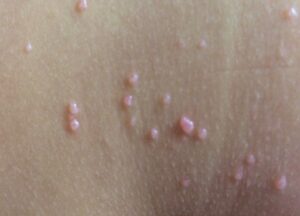How to Deal With a Toddler who Hits and Bites


Toddlers are constantly experimenting with new ways to be understood—even if those methods aren’t always allowed. For many, this includes hitting and biting as a form of communication and a guaranteed way to grab your attention.
There are several reasons a toddler might resort to hitting and biting:
1. He or she is trying to tell you something and is frustrated that you don’t seem to be getting the message. Believe it or not, hitting and biting can be highly effective forms of communication for toddlers, who quickly learn they will almost always get attention for these behaviors.
2. Your toddler’s environment is stimulating or they have a physical need that needs to be met. Consider what’s going on when your toddler hits. Is it around nap time? Just before lunch or dinner? When their resources are running low, toddlers may act out. Take note of this. Is this a recurring theme? If so, work to change the environment or schedule around the time he or she hits.
3. Your toddler is tired. Exhaustion can easily lead to aggression. If you notice this is the case, try moving up nap time a half hour. Try asking, “Are you sleepy?” even if you know you won’t receive a verbal answer. This is valuable because it teaches your toddler that verbal communication is an effective means of being understood.
It’s never acceptable when a toddler hits or bites. These behaviors can cause issues with playgroups and, later, preschool, so it’s important to address hitting and biting right away. If your toddler is hitting because he or she is over-stimulated, hold their hands and let them know that biting or hitting is not okay. Offer a book, sing a song, go for a walk, or have some cuddle time to relax. If your toddler is scared or angry, try to give a brief explanation and address the fear. Finish with a hug.
Once you’ve addressed the immediate behavior, you can offer alternatives to hitting or biting. You can say things like, “Use words,” or even teach simple hand signals to communicate. Refrain from using value judgments like, “You’re a bad boy/girl.” You want to critique the behavior itself, not your child. Instead, say something like, “I think you are tired. We had a long day, and it’s close to your nap time. Please don’t hit me. Use words instead.”
Ultimately, once the immediate issue is handled, it’s all about your reaction as a parent. You want to address the behavior immediately, help the child understand why he or she might be acting out, and offer acceptable alternatives. You don’t want to ignore it, encourage it by paying attention to it, or send messages that your child is a bad person because they hit or bite. Over time, as your toddler continues to develop, he or she will learn new ways to cope with challenging situations.
Powered by Bundoo®










































